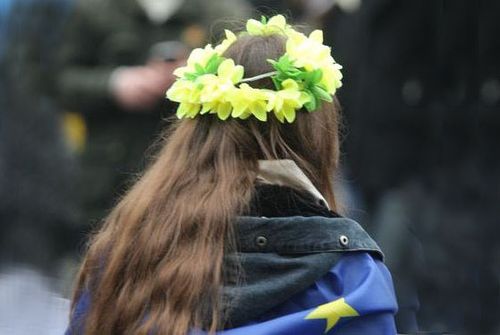“It is important not to go beyond nonviolent resistance today”
Euromaidan activists on ways to harness civic energy and general enthusiasm of the nation
We will mark the Euromaidan’s first week on November 28. The latest TV interview with the guarantor of Constitution (that is, Ukraine’s president) has shown that the government is not going to sign the Association Agreement on November 29 in Vilnius, if at all. Some equate the Euromaidan with the Orange Maidan of 2004, but, any similarities and differences notwithstanding, one thing is undeniable: we are dealing with a powerful wave of public enthusiasm that has accumulated enormous energy which has to be directed somewhere in any case. Thousands of Ukrainians throughout Ukraine continue to take to the central squares of their cities to make a stand for values rather than any particular political grouping. We are facing many questions now, such as “What will happen next? What to do with that energy? How to direct it even if the government will fail to sign the agreement?” and a highly telling, though no less relevant question: “Do our politicians, in power and opposition alike, worthy of the nation which took to the streets to defend its European integration ambitions?” Obviously, all these events may force Ukrainians to rethink a lot of positions, but it seems that a new attempt at it has begun already.
Kateryna ZHEMCHUZHNYKOVA, journalist and civic activist, Donetsk:
“People who stand on their Euromaidans now are primarily promoting values, not geography. These are not people who want to go abroad to seek their fortunes there, they want to create conditions here in Ukraine that would allow them to live decent lives. These people want to have Europe built in Ukraine rather than to move to Europe themselves. I do not think that failure to sign the agreement would disappoint these people to the point of seeking ways to emigrate. Rather, it would serve as an impetus to mobilize for action across Ukraine. We have been disappointed since November 21 when we learned of the Cabinet’s decision.
“I am 98 percent sure that our protest will end in victory, but I recognize that I could be wrong, too. Should it be so, we would, perhaps, join the permanent Euromaidan in the capital and demand the immediate resignation of the Cabinet.”
Dmytro PYLYPETS, leader of the Kharkiv Euromaidan:
“I think we have two options here. First involves Ukraine remaining neutral and this government surviving until elections in 2015 which would replace the president by legitimate means. Second option would see the government starting an active campaign of rapprochement with Russia and restoration of the Soviet-era situation. The public would demand the immediate resignation of the Cabinet and the president then.
“People are enthusiastic now, similarly to 2004. Still, I can see this mood transformed, and these peaceful assemblies escalating into more radical actions.”
Olesia OZYRSKA, civic activist and participant of the Euromaidan protest in the Crimean city of Yevpatoria:
“Very few people are willing to take to the street and show where they stand in the Crimea. I myself came from Zaporizhia and feel the difference between attitudes in the two regions. There, people understand why we need the EU and why the Customs Union is a bad choice. Most young people here feel the same way, and it is nice to see it.
“The signing will happen, even if we need to impeach this president and force this cabinet to resign before. To do this, we need just collect enough signatures of Ukrainian citizens. I think we can do it, given the current levels of civic activity.
“We will keep faith as long as we can go in force to the streets. I love my native country now more than ever before, I feel it inside me, so we will overcome every obstacle this time! Glory to Ukraine!”
Pavlo OSTROVSKY, student at the Ukrainian Catholic University, Lviv:
“We will be disappointed in any case. It was to be expected that they will not sign the agreement. Now it is difficult to predict what will happen next. The government is only exacerbating the conflict now instead of solving it.
“It is important not to go beyond nonviolent resistance today, to keep it a peaceful public protest (I stress that this is a public movement). Any violence could play into the hands of the authorities. It is also important that politicians’ participation is minimal in Lviv, while the public in Kyiv persuaded them to stop using party flags.”






